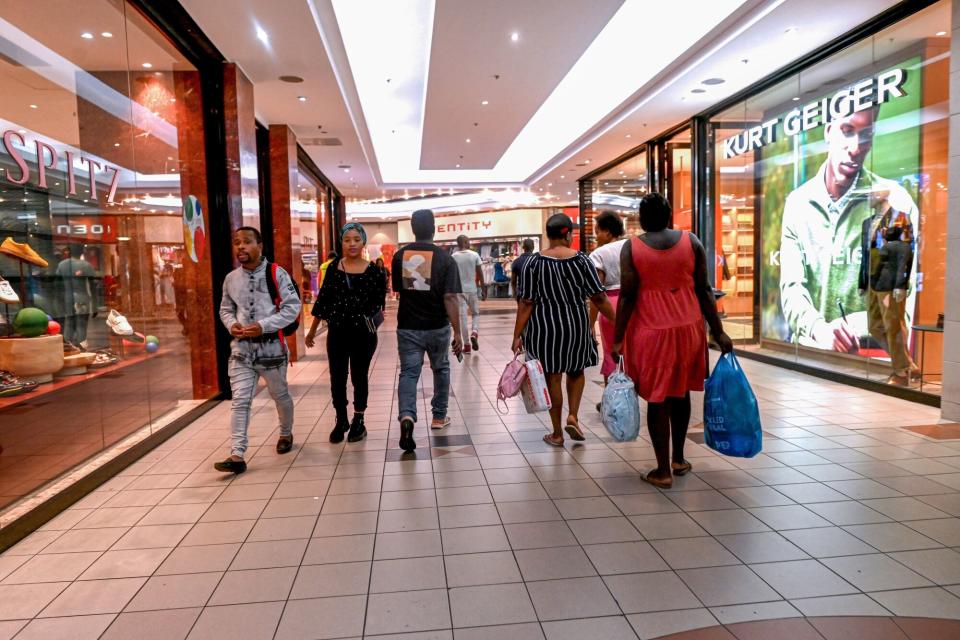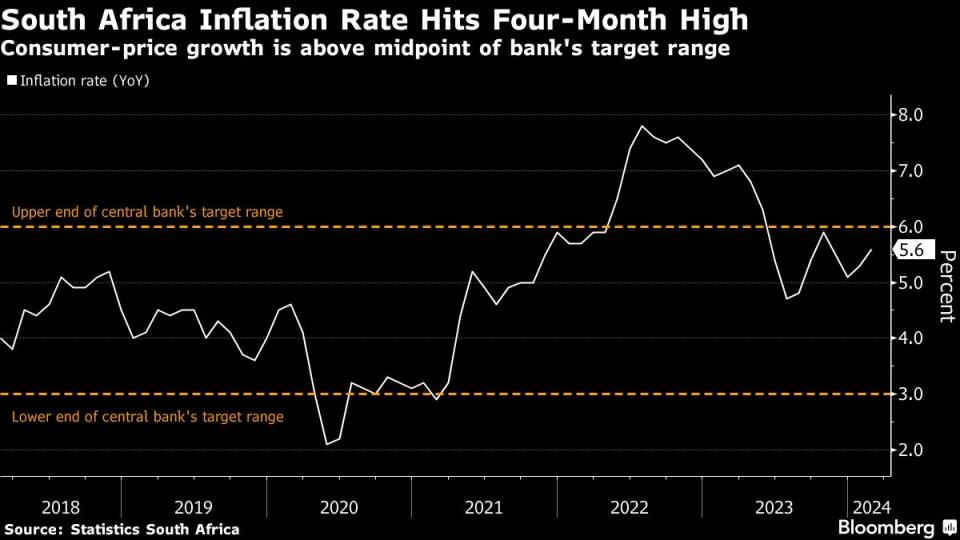South Africa Inflation Hits Four-Month High Before Rate Call
(Bloomberg) -- South Africa’s inflation rate climbed to a four-month high, likely cementing the central bank’s resolve to keep borrowing costs on hold when it meets next week.
Most Read from Bloomberg
Baltimore Wants to Sell Hundreds of Vacant Homes for $1 Each
Sam Bankman-Fried Says 50-Year Sentence Only Suitable for a ‘Super Villain’
Justice Department to Sue Apple for Antitrust Violations as Soon as Thursday
Trump Rules Out Vivek Ramaswamy as Running Mate as He Eyes New Team
Fed Signals Three Rate Cuts Are Still Likely, Despite Inflation Uptick
The consumer price index rose to 5.6% in February from a year earlier, compared with 5.3% the prior month, Pretoria-based Statistics South Africa said Wednesday in a statement on its website. The median of 17 economists’ estimates in a Bloomberg survey was 5.5%.
Yields on government bonds pared an earlier drop. They fell as much as 13 basis points before the data was released. They traded 3 basis points lower from closing levels at 12.08%
Forward-rate agreements starting in a month’s time show traders aren’t pricing in a rate cut at the March meeting and see a less than 10% chance of a 25 basis-point rate hike. The first chance they see of a cut is in July.
The uptick in inflation means the rate has moved further away from the 4.5% midpoint of the South African Reserve Bank’s target range, where it prefers to anchor expectations. It also comes a day after data showed average inflation expectations for this year and next remain above that midpoint, although they declined slightly from the previous report.
Read More: South Africa Inflation Expectations Dip Before Rate Meeting
“The stronger-than-expected reading for February gives further excuses for the SARB to delay its easing cycle until after the election,” which will be held on May 29, David Omojomolo, Africa economist at Capital Economics, said in a research note. “As things stand, we now expect the first cut to be delivered in September. Even then, the specter of uncertain fiscal policy will remain and could delay easing further.”
Governor Lesetja Kganyago has repeatedly said that until inflation retreats to 4.5% in a sustainable manner and settles there, the central bank will be unwilling to adjust its policy stance.
Analysts polled by Bloomberg predict the governor and his colleagues will leave interest rates at a 15-year-high of 8.25% for a fifth straight meeting when they announce their policy decision on March 27.
February’s price-growth was largely driven by higher transport costs, housing & utilities and food and non-alcoholic beverages.
Core inflation, which excludes the cost of food, non-alcoholic drinks, fuel and electricity, quickened to 5% from 4.6% in January as rising health-insurance costs filtered into the data. The annual rate for health insurance rose to 12.9% and premiums for all types of insurance increased by 9.5% over the past year, the statistics agency said.
The statistics agency surveys medical-insurance costs biannually in February and April.
--With assistance from Simbarashe Gumbo, Paul Richardson and Colleen Goko.
(Updates with analyst comment in fourth paragraph)
Most Read from Bloomberg Businessweek
Selling Shohei Ohtani: Can Baseball’s Biggest Talent Transform the Sport?
OpenAI Sprinting to Keep Up With Startups on AI-Generated Video
Julius Baer Hits Reboot to Escape Swiss Banking’s New Malaise
China’s Super-Cheap EVs Offer Hope for Average American Buyers
©2024 Bloomberg L.P.



